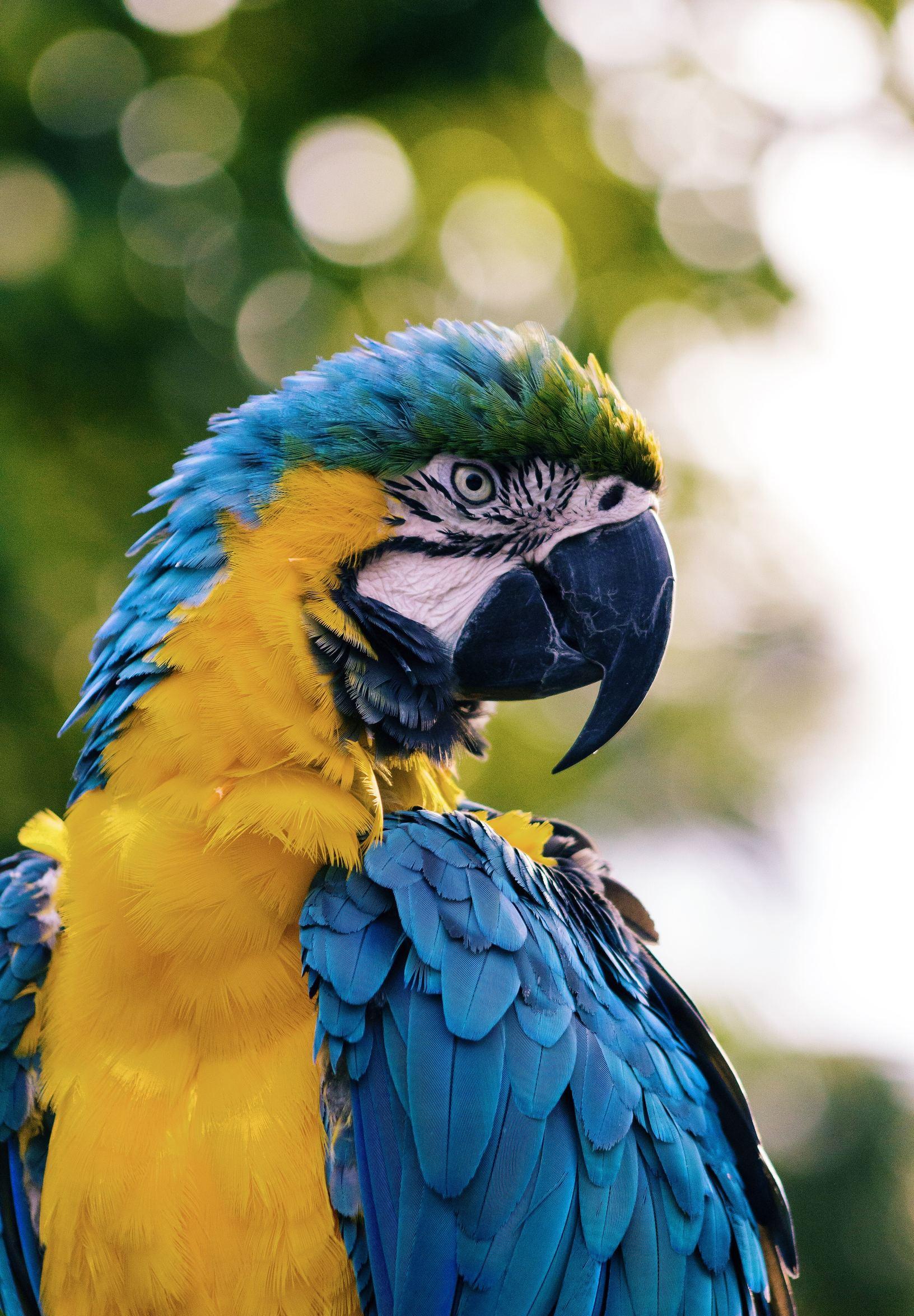Parrots are many birds of the order Psittaciformes (scientific name: Psittaciformes). Typical climbing birds, with toe-shaped feet, two toes forward and two toes backwards, suitable for grasping, the beak is strong and powerful, and can eat hard shell fruit. The plumage is brightly colored and is often kept as a pet.

It is distributed in a vast area of warm, sub-heat and tropical. There are 2 families, 82 genera, and 358 species, making it one of the largest families of ornithischia. It is mainly distributed in tropical forests.
The largest of the parrots is the purple-blue macaw, which can reach a length of up to 100 cm, and the smallest is the blue-crowned short-tailed parrot, which is only 12 cm long.
The way parrots carry nest material is very special, not with the curved and powerful beak, but by tucking the nest material into the short tail feathers, and other couple parrots of the same kind also use this way to build nests with materials.
There are 6 species of pygmy parrots, all of which are within 10 cm in length. Six species are found only in New Guinea and nearby islands.
Parrots come in a wide variety of species, with different shapes and bright plumage. There are luxurious and elegant purple and blue macaws, sunflower cockatoos with yellow crowns on their white heads, Amazon parrots that can speak well, colorful rainbow honey-sucking parrots, small sunflower-like cockrots, small and exquisite tiger skin parrots and peony parrots, eclectic parrots with big red and green, and African grey parrots shaped like pigeons.
Parrots are found in tropical regions around the world. Some species in the Southern Hemisphere extend to temperate regions, while others spread to distant islands.
Parrots are the most diverse in Latin America and Oceania, and much less in Africa and Asia, but there are some well-known species in Africa, such as grey parrots, lovers parrots, and peony parrots.
The most famous of the parrots in Latin America is the various large macaws.
Parrots in Oceania are more diverse than in Latin America, with toes in the toe-toe type and second and third toes forward, including some of the most familiar, beautiful and unique parrots.
Parrots are pets that people like to keep, and their wild populations are threatened as a result, and many species are endangered.
Parrot species live mainly in lowland tropical forests and often fly to orchards, farmland and open grassy fields. There are fewer species of parrots distributed in the mountains, such as the Papua honeyeater, john's honeyeater, and the Chinese parrot.
They generally move in small groups of mates and families, inhabiting the branches of the forest, and the main nest is a tree hole.
Most parrots feed on plant fruits, seeds, nuts, berries, young shoots, etc. on trees or on the ground, and also eat a small number of insects. Honey-sucking parrots feed on pollen , nectar and soft, juicy fruits.
During feeding, parrots often combine a strong hook-like beak with flexible paired toe-shaped feet.
Pair of toe-type feet, two toes forward and two toes backwards, suitable for grasping, when climbing in the canopy for food, first bite the branches with the mouth, and then on the heels;
When walking on a solid trunk, the tip of the mouth is inserted into the tree to balance the body to speed up the movement; when eating, one of the feet is often used as a "hand" to hold the food and stuff the food into the mouth.
More than 10 species of parrots have been observed how often they use their left and right feet in feeding, and found that more than 72% of individuals tend to grasp with their left feet. Comparative dissection of the muscles of the hind limbs found that those who often grasp food with their left foot have obviously longer left feet than their right feet, and those who use their right feet to grasp food are only slightly longer than their left feet.
The lifespan of different species of parrots is also different, generally small parrots 7 to 20 years, medium and large parrots average lifespan of 30 to 60 years, some medium-sized parrots can live to about 80 years old, such as sunflower cockatoos, Amazon parrots, gray parrots and so on.
The longest-lived bird in the world is a parrot, it is an Amazon parrot named Jamie, born in Liverpool, England, December 3, 1870, died on November 5, 1975, at the age of 105, is the oldest birthday of birds.
With the extension of the footprints of human civilization and the development of industrialization, these beautiful birds are also facing the deterioration of the living environment, the population has decreased sharply, and some species have been or are close to extinction.
The most beloved skill of parrots is to emulate human paragonism. In fact, their "ventriloquism" is indeed very superior among birds.
In fact, this is just a kind of conditioned reflex, mechanical imitation. This imitation behavior is also scientifically called imitation. Because birds do not have a well-developed cerebral cortex, they have no mind and consciousness, and it is impossible to understand the meaning of human language.
Parrots are now fully listed on the IUCN's 2012 Red List of Threatened Species ver 3.1.